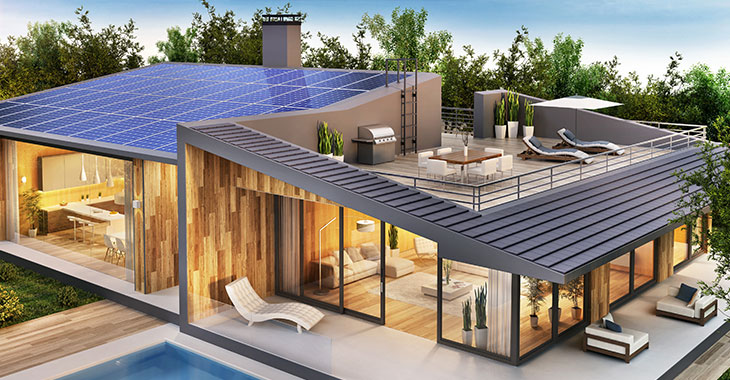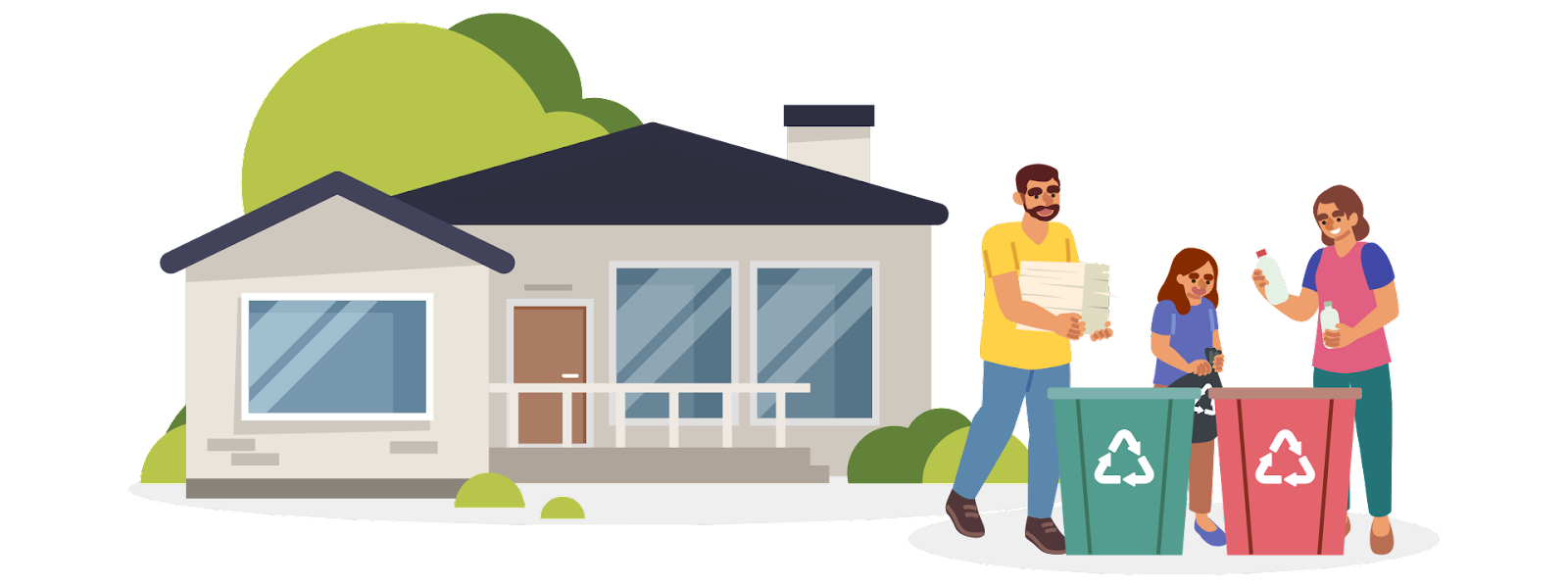Sustainable & eco-friendly homebuilding practices aim to reduce the negative impact of construction on the environment. By reducing energy consumption, using eco-friendly materials, and minimizing waste, these practices help minimize pollution and lower operating costs for building owners. Additionally, they improve indoor air quality, occupant health, and safety.
To create a sustainable & eco-friendly living space, building materials with low VOC emissions and low off-gassing are essential. Unfortunately, materials such as paint, flooring, and insulation usually contain chemicals known as VOCs that can negatively affect indoor air quality and human health. Therefore, the use of building materials with low VOC emissions and low off-gassing can limit the release of chemicals into the air and provide a healthier and more environmentally friendly living space.
Top 10 Sustainable & Eco-Friendly Homebuilding Practices
1. Renewable Energy:
Contractors commonly incorporate solar panels into their building designs to provide clean, renewable energy that can reduce reliance on traditional energy sources. This can improve energy efficiency and lower energy bills.
2. Energy-Efficient Designs:
- Marin County, CA, is known for its commitment to environmental sustainability, and this extends to its approach to home design.
- High quality insulation, more air sealing, and energy-efficient lighting and appliances into their designs.
- These features help to create homes that use less energy and are more comfortable for occupants. Reduces energy bills while minimizing the environmental impact.
3. Sustainable Materials
- Eco-friendly building materials and can reduce the environmental impact of construction projects.
- Bamboo, reclaimed wood, recycled steel, and natural insulation materials like cellulose and sheep’s wool.
- Using sustainable materials not only reduces waste and conserves resources but also provides homes with healthier indoor air quality and can help reduce energy consumption.
- With the increasing emphasis on sustainability and environmental responsibility, sustainable building materials are a smart choice for those who want to build homes that are both eco-friendly and beautiful.
4. Water Conservation
- Water conservation is another essential aspect of sustainable home building practices in Marin County.
- Water-saving features and rainwater harvesting systems to reduce consumption and runoff. Here are some water-saving features commonly used in sustainable home building practices in Marin County:
- Low-Flow Toilets: Low-flow toilets use significantly less water per flush compared to traditional toilets, helping to reduce water consumption.
-
Water-Efficient Faucets: Water-efficient faucets are designed to limit water flow while maintaining adequate pressure, reducing water waste during daily use.
-
High-Efficiency Showerheads: Provides a satisfying shower experience while using less water per minute.
-
Dual-Flush Toilets: Offering two flush options, typically a low-volume flush for liquid waste and a higher-volume flush for solid waste, allowing users to conserve water.
- Greywater Recycling: Capture and treat wastewater from sinks, showers, and laundry for reuse in landscape irrigation, reducing the demand on freshwater sources.
-
Drip Irrigation: Deliver water directly to plant roots, minimizing evaporation and runoff, and ensuring efficient water use in landscaping.
-
Soil Moisture Sensors: These sensors monitor soil moisture levels and adjust irrigation systems accordingly, preventing overwatering.
-
WaterSense-Labeled Appliances: A certification program that identifies water-efficient appliances like dishwashers and washing machines, which can significantly reduce water consumption.
5. Sustainable & Eco Friendly Materials:
- Make sure to choose eco-friendly and locally sourced building materials, including recycled or reclaimed materials whenever possible.
Example:
Gutex Insulation
Tired of high energy bills and struggling to maintain comfortable temperatures in your home?
Gutex, a natural insulation material made from wood fibers, could be your solution. Gutex offers superior thermal performance and is an eco-friendly and sustainable alternative to traditional insulation materials.
- It can reduce energy consumption and lower heating and cooling costs while also regulating moisture levels in your home,
- Prevents the growth of harmful toxins like mold.
- Does not contain harmful chemicals such as formaldehyde and VOCs
- Non-toxic and water-resistant.
6. High-Quality Insulation:
-
- Use insulation materials that are effective in maintaining a comfortable indoor temperature, reducing the need for excessive heating or cooling. Example: (GUTEX)
7. Rainwater Harvesting:
-
- Install systems to capture and reuse rainwater for irrigation or other non-potable water needs.
Rainwater harvesting systems collect rainwater from rooftops and store it for various non-potable uses, such as irrigation, flushing toilets, and outdoor cleaning.
8. Native Landscaping:
- Opt for native and drought-resistant plants in landscaping to reduce water requirements and support local biodiversity.
9. Waste Reduction:
- Minimize construction waste by recycling and reusing materials during the building process.
10. Smart Home Technology:
-
- Integrate smart home technologies for efficient energy management, including programmable thermostats, energy monitoring systems, and home automation.
Conclusion
- Sustainable building practices reduce construction’s impact on the environment and create comfortable resilient homes.
- Contact the Pros at Home Stewards if you need help with you next project






:max_bytes(150000):strip_icc()/beginners-guide-to-rainwater-harvesting-5089884_V3-d4a6f6a568fc4f348598d9b98f96b6b7.png)



0 Comments